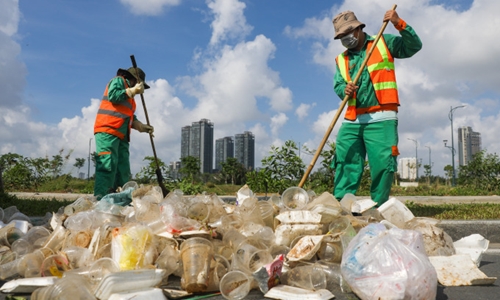The municipal People’s Committee has decided on the investment strategy for two projects, one of Vietstar Joint Stock Company and one of Tam Sinh Nghia Investment Development Joint Stock Company.
    |
 |
|
Sanitation workers collect garbage in Ho Chi Minh City's Thu Duc city, November 2022. |
Each of them would be able to process about 2,000 tons of waste per day.
The remaining three projects are finishing legal procedures for investment, including Vietnam Waste Solutions Inc with a capacity of 3,000 tons per day, Ho Chi Minh City Urban Environment Co Ltd. with a capacity of 1,000 tons per day, and Tasco Joint Stock Company with a capacity of 500 tons per day.
The People’s Committee has assigned the Refrigeration Electrical Engineering Corporation (REE Corp) to conduct a pre-feasibility study on a solid waste treatment and energy recovery plant, which is expected to be located at the city’s Northwest Solid Waste Treatment Complex as part of a public-private partnership (PPP).
The city generates about 9,700 tons of solid waste daily with complicated composition and characteristics, putting great pressure on domestic waste management, collection, transportation and treatment units.
Of that, about 70% is buried daily, while the rest is recycled or burned to generate electricity each day.
By 2025, the city aims to have 100% of its domestic solid waste be collected and treated, and at least 80% of solid household waste classified at source.
It is taking steps to reduce the volume of buried waste, with the goal of burying 2,600 tons of waste per day.
It targets having at least 80% of total domestic solid waste in urban areas be recycled for compost fertilizer or burned for electricity.
The city plans to adopt advanced waste-treatment technologies, will invest in solid waste treatment with advanced technologies that save energy and protect the environment, and seek recycling technology that makes recycled products suited to the consumption habits of each locality.
The city’s Department of Natural Resources and Environment is working with other departments and agencies to encourage local waste treatment facilities to switch to waste-to-energy technologies.
It is also making efforts to promote digital transformation in the collection, treatment and management of the huge volume of domestic solid waste discharged daily.
Source: VNA